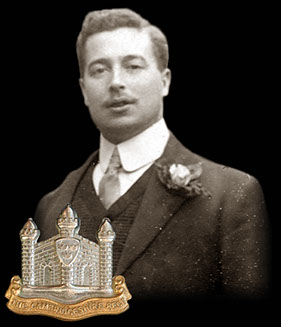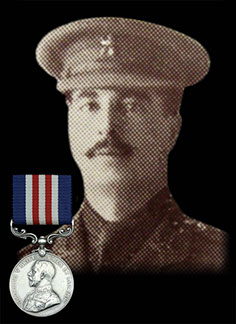Christopher Vale MM
Born in 1887 at Ely, Christopher Vale was the son of a brewery foreman at one of the large breweries near the family home in the Waterside area of Ely. After leaving school he worked for a while as a telegraph messenger before joining the Great Eastern Railway as a Police Constable. One of his older brothers, Frederick along with his younger brother, Herbert, joined the Ely Company of the 3rd VB Suffolk Regiment. Herbert joined in 1907 as a 14-year-old Bugler, by which time Frederick had already been serving for several years and was a Lance Corporal. Both continued their service once the Territorial Force was formed in 1908, but by the outbreak of the war they had finished their time with the Cambridgeshire Regiment.
Christopher remained at his parents house although the nature of his work led to him travelling often and he was based initially at London and then Harwich. Shortly after war was declared Christopher travelled to Cambridge and volunteered with the Cambridgeshire Regiment. He was given the army number 2642 and was posted to the Ely and District Squad for training. After training he joined the 1st Battalion near Bury St Edmunds as they prepared for overseas service.
Christopher was with the 1/1st Battalion when it arrived in France on the 15th February 1915 as part of D Company. A little over a month later he was promoted to Acting Corporal and was proving to be an excellent soldier. On the 2nd April he was in the front line with his platoon, which was temporarily attached to the 2nd Battalion, The Leinster Regiment. Several German artillery or trench mortar shells landed near their position and a sandbag was dislodged landing on Christopher causing a severe hernia. He was evacuated back to the UK and after an operation spent time recovering at a hospital in Guildford.
After convalescing he was posted to one of the regiment’s Reserve Battalions in the UK and early in 1916 he married Dorothy M. Barton at Bury St Edmunds. He soon returned to the Western Front as part of a draft of men sent out to the 1/1st Battalion in March 1916. By early August trench life look its toll on Christopher and he was diagnosed with influenza and spent the rest of the month recovering. After arriving back at his battalion in early September he reverted back to the rank of Private at his own request.
Christopher took part in the battalion’s attack on the Schwaben Redoubt at Thiepval and a month later during the attack on St Pierre Divion he was awarded the Military Medal for gallantry. Several days later he was once again promoted to Corporal and then in early 1917 to Sergeant. After some time in hospital in June 1917 due to a problem with a toe he was selected for a commission and returned to the UK for officer training. Once this was completed he joined the 3rd Battalion, The Norfolk Regiment as a 2nd Lieutenant. After being commissioned he was presented an officer’s sword by Major Chauncy, the Chief of the G.E.R. Police, the blade etched “Presented to C. Vale by Comrades in the G.E.R. Police”.
In April 1918 the now 2nd Lt. Vale MM, once again sailed to France and was posted to the 7th Battalion, The Norfolk Regiment. His stay was short as a week later he was hospitalised for the next several months due to sickness. He returned to the 7th Battalion in early July 1918. While he had been in hospital the 1/1st Cambs had left the 39th Division and joined the 7th Norfolks in the 35th Brigade, 12th Division. When not in the trenches Christopher was therefore able to catch up with his old friends still serving with the Cambs.
On the 8th August during the battalion’s attack at Morlancourt he was caught in the blast of a German artillery shell. He was left partially buried, severely concussed and suffering from the effects of gas. Alongside these physical injuries Christopher was also severely shaken and suffering from shellshock. He was taken to the nearby 12th Casualty Clearing Station and then on to the 4th General Hospital after which he was evacuated back to the UK.
Due to the “severe concussion of the brain” he was sent to The Maudsley Neurological Hospital in London and then the Imperial Hydro Hospital at St Annes-on-Sea for three months. During his time convalescing it was announced that he was to receive the Military Cross for his bravery in 1918, however for some reason this was never made official and was never gazetted. Christopher remained in the Army for the next six months but was not classed as being fully fit, and was finally disembodied in June 1919.
After he returned home Christopher and Dorothy moved to Leytonstone and he went back to work with the railway police. Sadly he suffered badly from the mental effects of the war and had ongoing problems with his nerves. Despite this he was able to continue his career with the G.E.R.’s successor - the L.N.E.R. and he worked out of Liverpool Street and then Bishopsgate reaching the rank of Detective Constable.
Christopher and Dorothy had one child, a daughter called Katherine born at Bury St Edmunds in 1922. Christopher died suddenly at Leytonstone in November 1935 at the age of 47. His coffin was draped with the Union Flag and the sword presented by the G.E.R. in 1917 was placed on top. It was taken by train to Bury St Edmunds with a uniformed Guard of Honor from the L.N.E.R. Police. The funeral service took place at St Mary’s Church and was well attended by family and friends. Numerous floral tributes were made including one from Dorothy and Katherine that bore the message “With the happiest of memories of my darling hubby, from his broken-hearted wife and daughter“.
Both Dorothy and Katherine remained in Bury St Edmunds, Katherine marrying there in 1947. Dorothy never remarried and died in 1982.

Christopher before the war.

2nd Lt Vale MM, Norfolk Regiment in 1918.

This site went live on the 14th February 2015 to mark 100 years since the 1/1st Cambs went off to war.
WE WILL REMEMBER THEM
Email us: cambsregt@gmail.com
Copyright 2015, 2016, 2017, 2018, 2019 by Felix Jackson. The information and images on this site should not be reproduced without prior permission.